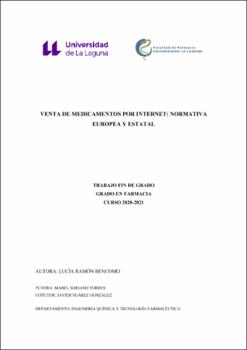Venta de medicamentos por internet: normativa europea y estatal
Author
Ramón Bencomo, LucíaDate
2021Abstract
La venta de medicamentos a través de páginas web ilegales representa un gran problema
de salud pública a nivel mundial que afecta tanto a nivel sanitario como económico. Las
mayores cifras de medicamentos falsificados distribuidos por internet se concentran en
esteroides, analgésicos, antimaláricos, así como medicamentos para la mejora de la
calidad de vida. A través de dichas páginas webs ilegales, se venden medicamentos no
autorizados y falsificados, por lo que carecen de las garantías legales de calidad,
seguridad, eficacia y constituyen un gran riesgo para la salud de sus consumidores.
El objetivo de este trabajo es el análisis de disposiciones legales tanto europeas como
estatales, con el fin de diagnosticar puntos fuertes y débiles en ella, así como analizar las
medidas que se han tomado.
Para la lucha contra la comercialización ilegal de medicamentos se han desarrollado
disposiciones legales, así como la intensificación de penas en el Código Penal Español.
Por otra parte, para la disminución del uso erróneo de estas webs ilegales se han
implantado unas medidas para regular la venta online de los medicamentos, que permiten
reconocer en su totalidad aquellas farmacias autorizadas para la venta de los mismos.
Así mismo, para combatir esta venta ilegal se intenta informar al consumidor de los
riesgos que supone la compra mediante estas vías por la presencia de medicamentos
falsificados o ilegales, a través de campañas de concienciación.
Las normativas frente a la venta por internet se han de reforzar para prevenir las
falsificaciones y combatir la entrada de medicamentos ilegales en el canal oficial de
distribución.
Por ello, las normativas dirigidas a la venta de medicamentos por web y oficinas de
farmacias obliga a que los medicamentos dispongan de dispositivos de seguridad tales
como el Sistema Español de Verificación de Medicamentos para garantizar la seguridad
del paciente. Así mismo, la Directiva 2011/62/UE del Parlamento Europeo y del Consejo,
recomienda hacer uso de oficinas de farmacia y páginas webs autorizadas, para la compra
de los mismos The sale of medicines through illegal websites represents a major public health problem
worldwide, affecting both health and the economy. The largest numbers of counterfeit
drugs distributed over the Internet are concentrated in steroids, analgesics, antimalarials,
as well as life-enhancing drugs. Through these illegal websites, unauthorized and
counterfeit drugs are sold, and therefore lack the legal guarantees of quality, safety,
efficacy and constitute a great risk to the health of consumers.
The aim of this work is the analysis of both European and national legal provisions, in
order to diagnose strengths and weaknesses in it, as well as to analyze the measures that
have been taken.
For the fight against the illegal marketing of medicinal products, legal provisions have
been developed, as well as the intensification of penalties in the Spanish Penal Code.
On the other hand, in order to reduce the misuse of these illegal websites, measures have
been implemented to regulate the online sale of medicines, which make it possible to fully
recognize those pharmacies authorized to sell them.
Likewise, in order to combat this illegal sale, an attempt is being made to inform
consumers of the risks involved in buying through these channels due to the presence of
counterfeit or illegal drugs, through awareness campaigns.
Regulations against Internet sales must be strengthened to prevent counterfeiting and
combat the entry of illegal drugs into the official distribution channel.
For this reason, the regulations aimed at the sale of medicines over the Internet and in
pharmacies require medicines to have safety devices such as the Spanish Medicines
Verification System to guarantee patient safety. Likewise, Directive 2011/62/EU of the
European Parliament and of the Council recommends the use of authorized pharmacies
and websites for the purchase of medicines.





